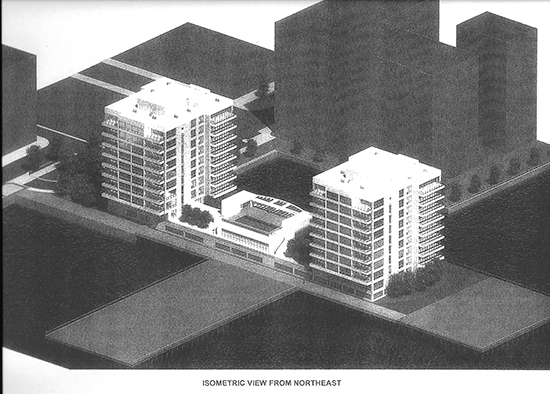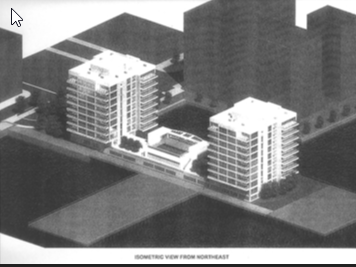FBW | October 17, 2015
In 1997, the Hoboken Planning Board granted site plan approval for the 1160-unit Shipyard project. The site plan and Board resolution included the provision for open space on the final development parcel, Block G. A Developer’s Agreement between the Shipyard Associates, the City and Planning Board also included this provision for open space as did the 1997 state waterfront permit.
But in 2011, shortly after completing the 1160 units, Shipyard Associates — brothers Michael and David Barry — reneged on their agreement and sought to replace the open space with 78 additional residential units, a project dubbed the Monarch Towers.
In its October 5, 2015 legal brief, the Hudson Tea Building Condo Association (HTBCA) states, “The facts of this case demonstrate a classic bait-and-switch operation, orchestrated by a rapacious developer that is eager to realize profit at any cost.” The brief continues, “Shipyard was adversarial from the outset. Shipyard elected to aggressively complicate the proceedings, and was ultimately successful in bludgeoning its way to approvals.”
Currently, these approvals, rendered in two controversial lower ourt decisions, are on appeal. On October 5, appellants City of Hoboken, Hoboken Planning Board and HTBCA all submitted their briefs to the Appellate Division of New Jersey Superior Court. The briefs contend that the lower court rulings were based on faulty interpretations of precedent-setting court decisions and the state’s Municipal Land Use Law.
The Fund for a Better Waterfront (FBW), having intervened in one of the lower court cases, is a respondent and will submit its brief by December. Shipyard Associates, true to form, has filed a motion seeking to block its participation. FBW is especially concerned about how the automatic approvals granted by the lower court has excluded the public from participating in the hearing process that would normally take place before the local boards. FBW is represented by Renee Steinhagen, the Executive Director of the New Jersey Appleseed Public Interest Law Center.
In 2012, the City of Hoboken filed suit to enforce the Developer’s Agreement between the City of Hoboken, the Planning Board and the Shipyard Associates. In their brief to the Appellate Court, the City of Hoboken, represented by Maraziti Falcon, cited testimony in 1997 before the Planning Board by Shipyard’s planner stating that Block G would be open to the public.
The City’s brief argues that Judge Patrick Arre erred in denying summary judgment, misinterpreting a key court decision — Toll Bros. v. Board of Chosen Freeholders — and failing to grasp the authority of the Planning Board that conditioned its approval on the developer providing this open space. Also, the brief states that the Developer’s Agreement required the Shipyard to obtain the City’s consent to modify this legally-binding contract but it failed to do so.
The Hoboken Planning Board brief, filed by attorney Dennis Galvin, made the case that the Board clearly lacked jurisdiction to hear the application, that the developer failed to make the case that circumstances had changed to require an amended site plan and that changes to FEMA’s flood hazard maps in December 2012 raised a public safety issue that Judge Nesle Rodriguez ignored when granting the automatic approvals.

Monarch Towers proposal viewed from the northeast. Buildings are in FEMA’s highest flood hazard risk zone.
The Planning Board attorney at the July 2012 Board meeting stated that the Board must wait for a resolution by the courts concerning the City’s lawsuit to enforce the Developer’s Agreement before conducting a hearing on the application. At the time, the Planning Board planner Eileen Banyra wrote up a long list of possible variances required and additional information needed before the application could be deemed complete.
The Appellate Court is hearing three separate cases involving the rulings in the lower court. All, however, will be heard by the same panel of judges simultaneously. One of these cases pertains to the lower court’s decision regarding rulings by the Hudson County Board of Freeholders and County Planning Board. The City and Planning Board are not a party to this case but the HTBCA is and defends the County’s decisions.
Last year, the Shipyard Associates initiated a lawsuit in federal court attempting to invalidate the ordinances passed by the Hoboken City Council in 2013 to protect against future flooding and storm events. In order to keep people out of harm’s way, the ordinances prohibit building residential projects on piers, all of which are in FEMA’s most hazardous flood zone. Last month, Shipyard filed a motion to dismiss its own case so they could refile in state court. Apparently, Shipyard grew fearful that the federal judge, who has denied several of its motions, was likely to rule against them. The City is the defendant in this case and HTBCA and FBW are intervenors.
Related links
Final legal dispute over Monarch Towers reaches NJ Supreme Court
NJ Supreme Court will rule on Monarch Towers dispute
Appellate Court ruling disregards well-established New Jersey land use case law
Monarch Towers sparks legal arguments over automatic approvals, changed circumstances, etc.
Appellate Court will hear appeal of 3 Monarch Towers cases
City settlement would shower tens of millions in benefits on Shipyard developers
Settlement proposed to end 5 year legal battle over Monarch Towers
Did NJDEP ignore its own coastal zone regs in granting permit? Appellate Court to decide
‘Rapacious’ developer must defend broken agreement in Appellate Court
Monarch towers case goes to Appellate Court
Monarch Towers litigation grinds on as public opposition persists
Federal judge grants FBW opportunity to help defend Hoboken’s flood ordinances
Developers challenge Hoboken flood ordinance in federal court
Judge grants automatic approval for controversial Monarch Towers
Monarch Towers described as classic case of bait and switch
Shipyard’s plan to privatize pier


